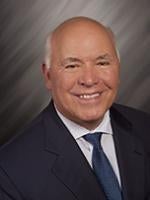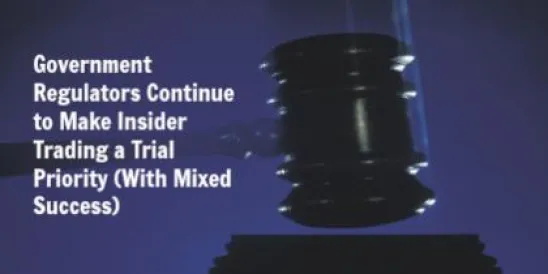Government regulators have started 2014 as they did throughout 2013 by continuing to go after insider trading both civilly and criminally. However, the U.S. Attorney’s office has had substantially more success in trying its criminal cases than the SEC has had recently in its civil trials. Why the government’s criminal prosecutors are having greater success proving criminal fraud than the SEC is having proving civil fraud might be because the SEC is pursuing cases that push the envelope on insider trading liability, either factually or legally. Whatever the reason, a trend might be developing.
Jury selection began last week in the Matthew Martoma criminal trial in New York. Martoma was an analyst for one of billionaire Stephen A. Cohen’s hedge fund vehicles, and he is accused of trading on inside information on behalf of the fund in pharmaceutical companies. According to the U.S. Attorney, Martoma’s trades helped Cohen’s hedge fund make, or avoid losing, $276 million. Because of this amount, a conviction could potentially result in a sentence lasting decades. Last fall, the Justice Department obtained a conviction at trial of an associate of Martoma and Cohen’s, Michael Steinberg, for insider trading. This victory follows the multiple convictions arising from the Galleon Management scandal, including Raj Rajaratnam and Rajat Gupta. The DOJ, along with the SEC, also obtained $1.8 billion in criminal and civil fines, a record in an insider trading case, from one of Cohen’s funds, to resolve the insider trading claims against the firm.
The SEC’s recent track record, on the other hand, has been notably less bulletproof. On Jan. 14, 2014, a federal jury in Chicago deliberated less than an hour before handing the SEC a defeat in SEC v. Yang. In that case, the SEC argued that Siming Yang “must have had” inside information based on the timing and kind of his profitable trades in advance of a corporate takeover, despite lacking any direct evidence that Yang ever spoke to a “tipper” who gave him inside information. Based on its verdict, it appears that the jury concluded that mere circumstantial evidence of trading on non-public information (primarily short-term, out-of-the-money call options) was insufficient proof of insider trading.
The week before, the SEC lost a bench trial in Georgia in which it alleged insider trading against Larry Schvacho, in connection with his acquisition of stock of Comsys IT Partners, a company whose CEO was a long-time personal friend of Schvacho’s. The SEC surmised that his discussions and meetings with the CEO in the run-up to the company’s acquisition by a competitor, which coincided with some of his stock purchases, meant that insider trading must have occurred. However, as in Yang, the SEC lacked any direct evidence that the CEO conveyed inside information to Schvacho; in fact, both the CEO and Schvacho denied it. In vindicating Schvacho, the court concluded that the agency’s interpretation of its circumstantial evidence “ignored” contrary interpretations and was “overreaching” and “self-serving.” These cases seem to suggest that juries are less likely than the SEC to infer insider trading in the absence of direct evidence. These two defeats follow the SEC’s loss at trial last fall when the Commission failed to prove that Mark Cuban violated the insider trading laws when he sold his shares of Mamma.com.
Nonetheless, SEC Chairperson Mary Jo White recently touted the Commission’s 80 percent success rate at trial, along with its recent change to its “no admit/no deny” settlements, as reasons why the Commission may soon take more cases to trial when necessary, bucking the long-standing downward trend in civil trials. Furthermore, in its recent annual report, the SEC has stated clearly that insider trading will remain an enforcement priority for 2014. In fiscal year 2013, the SEC brought 58 insider trading cases (roughly 13 percent of its enforcement actions) and resolved to make its “relentless pursuit” of individuals engaged in insider trading a “high priority” going forward. Whether these recent losses cause the SEC to revisit its interest in trying tough cases, or possibly embolden defendants, remains to be seen.







 />i
/>i

